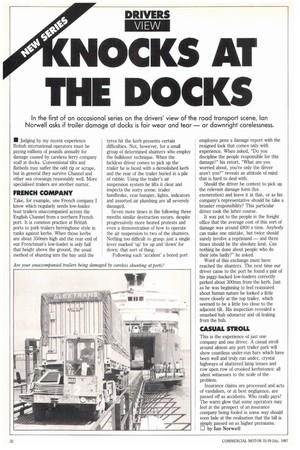NOCKS AT THE DOCKS
Page 34

If you've noticed an error in this article please click here to report it so we can fix it.
In the first of an occasional series on the drivers' view of the road transport scene, Ian Norwell asks if trailer damage at docks is fair wear and tear — or downright carelessness.
• Judging by my recent experience British international operators must be paying millions of pounds annually for damage caused by careless ferry company staff at docks. Conventional tilts and flatbeds may suffer the odd rip or scrape, but in general they survive Channel and other sea crossings reasonably well. More specialised trailers are another matter.
FRENCH COMPANY
Take, for example, one French company I know which regularly sends low-loader boat trailers unaccompanied across the English Channel from a northern French port. It is common practice at British ports to park trailers herringbone style in ranks against kerbs. When those kerbs are about 350mm high and the rear end of our Frenchman's low-loader is only half that height above the ground, the usual method of shunting into the bay until the tyres hit the kerb presents certain difficulties. Not, however, for a small group of determined shunters who employ the bulldozer technique. When the luckless driver comes to pick up the trailer he is faced with a demolished kerb and the rear of the trailer buried in a pile of rubble. Using the trailer's air suspension system he lifts it clear and inspects the sorry scene: trailer handbrake, rear bumper, lights, indicators and assorted air plumbing are all severely damaged.
Seven more times in the following three months similar destruction recurs, despite progressively more heated protests and even a demonstration of how to operate the air suspension to two of the shunters. Nothing too difficult to grasp: just a single lever marked `up' for up and 'down' for down; that sort of thing.
Following each 'accident' a bored port employee pens a damage report with the resigned look that comes only with experience. When asked, "Do you discipline the people responsible for this damage?" his retort, "What are you worried about, you're only the driver aren't you?" reveals an attitude of mind that is hard to deal with.
Should the driver be content to pick up the relevant damage form (his exoneration) and leave it at that, or as his company's representative should he take a broader responsibility? This particular driver took the latter course.
It was put to the people in the freight office that the average cost of this sort of damage was around £800 a time. Anybody can make one mistake, but twice should surely involve a reprimand — and three times should be the absolute limit. Can nothing be done about people who do their jobs badly?" he asked.
Word of this exchange must have reached the shunters. The next time our driver came to the port he found a pair of his piggy-backed low-loaders correctly parked about 300mm from the kerb. Just as he was beginning to feel reassured about human nature he looked a little more closely at the top trailer, which seemed to be a little too close to the adjacent tilt. His inspection revealed a smashed hub odometer and oil leaking from the hub.
CASUAL STROLL
This is the experience of just one company and one driver. A casual stroll around almost any port trailer park will show countless under-run bars which have been well and truly run under, crystal highways of shattered lamp lenses and row upon row of crooked kerbstones: all silent witnesses to the scale of the problem.
Insurance claims are processed and acts of vandalism, or at best negligence, are passed off as accidents. Who really pays? The warm glow that some operators may feel at the prospect of an insurance company being fooled in some way should soon fade at the realisation that the bill is simply passed on as higher premiums. 0 by Ian Norwell




















































































